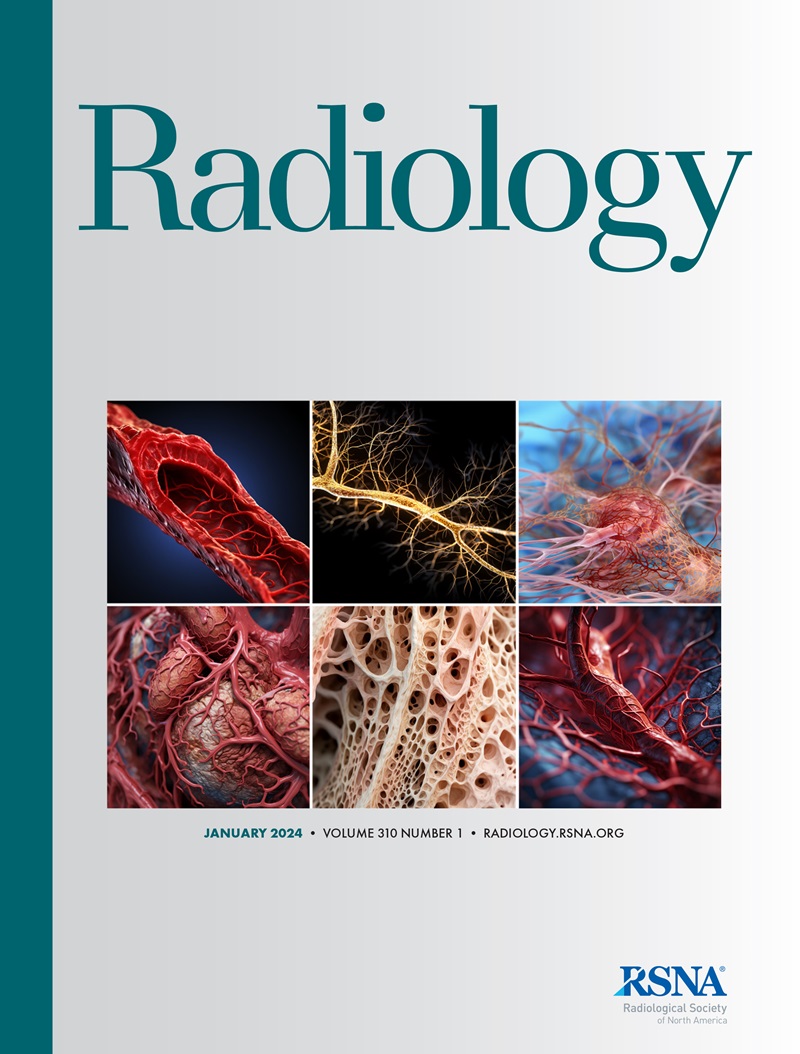求助PDF
{"title":"Performance of GPT-4 with Vision on Text- and Image-based ACR Diagnostic Radiology In-Training Examination Questions.","authors":"Nolan Hayden, Spencer Gilbert, Laila M Poisson, Brent Griffith, Chad Klochko","doi":"10.1148/radiol.240153","DOIUrl":null,"url":null,"abstract":"<p><p>Background Recent advancements, including image processing capabilities, present new potential applications of large language models such as ChatGPT (OpenAI), a generative pretrained transformer, in radiology. However, baseline performance of ChatGPT in radiology-related tasks is understudied. Purpose To evaluate the performance of GPT-4 with vision (GPT-4V) on radiology in-training examination questions, including those with images, to gauge the model's baseline knowledge in radiology. Materials and Methods In this prospective study, conducted between September 2023 and March 2024, the September 2023 release of GPT-4V was assessed using 386 retired questions (189 image-based and 197 text-only questions) from the American College of Radiology Diagnostic Radiology In-Training Examinations. Nine question pairs were identified as duplicates; only the first instance of each duplicate was considered in ChatGPT's assessment. A subanalysis assessed the impact of different zero-shot prompts on performance. Statistical analysis included χ<sup>2</sup> tests of independence to ascertain whether the performance of GPT-4V varied between question types or subspecialty. The McNemar test was used to evaluate performance differences between the prompts, with Benjamin-Hochberg adjustment of the <i>P</i> values conducted to control the false discovery rate (FDR). A <i>P</i> value threshold of less than.05 denoted statistical significance. Results GPT-4V correctly answered 246 (65.3%) of the 377 unique questions, with significantly higher accuracy on text-only questions (81.5%, 159 of 195) than on image-based questions (47.8%, 87 of 182) (χ<sup>2</sup> test, <i>P</i> < .001). Subanalysis revealed differences between prompts on text-based questions, where chain-of-thought prompting outperformed long instruction by 6.1% (McNemar, <i>P</i> = .02; FDR = 0.063), basic prompting by 6.8% (<i>P</i> = .009, FDR = 0.044), and the original prompting style by 8.9% (<i>P</i> = .001, FDR = 0.014). No differences were observed between prompts on image-based questions with <i>P</i> values of .27 to >.99. Conclusion While GPT-4V demonstrated a level of competence in text-based questions, it showed deficits interpreting radiologic images. © RSNA, 2024 See also the editorial by Deng in this issue.</p>","PeriodicalId":20896,"journal":{"name":"Radiology","volume":"312 3","pages":"e240153"},"PeriodicalIF":15.2000,"publicationDate":"2024-09-01","publicationTypes":"Journal Article","fieldsOfStudy":null,"isOpenAccess":false,"openAccessPdf":"","citationCount":"0","resultStr":null,"platform":"Semanticscholar","paperid":null,"PeriodicalName":"Radiology","FirstCategoryId":"3","ListUrlMain":"https://doi.org/10.1148/radiol.240153","RegionNum":1,"RegionCategory":"医学","ArticlePicture":[],"TitleCN":null,"AbstractTextCN":null,"PMCID":null,"EPubDate":"","PubModel":"","JCR":"Q1","JCRName":"RADIOLOGY, NUCLEAR MEDICINE & MEDICAL IMAGING","Score":null,"Total":0}
引用次数: 0
引用
批量引用
Abstract
Background Recent advancements, including image processing capabilities, present new potential applications of large language models such as ChatGPT (OpenAI), a generative pretrained transformer, in radiology. However, baseline performance of ChatGPT in radiology-related tasks is understudied. Purpose To evaluate the performance of GPT-4 with vision (GPT-4V) on radiology in-training examination questions, including those with images, to gauge the model's baseline knowledge in radiology. Materials and Methods In this prospective study, conducted between September 2023 and March 2024, the September 2023 release of GPT-4V was assessed using 386 retired questions (189 image-based and 197 text-only questions) from the American College of Radiology Diagnostic Radiology In-Training Examinations. Nine question pairs were identified as duplicates; only the first instance of each duplicate was considered in ChatGPT's assessment. A subanalysis assessed the impact of different zero-shot prompts on performance. Statistical analysis included χ2 tests of independence to ascertain whether the performance of GPT-4V varied between question types or subspecialty. The McNemar test was used to evaluate performance differences between the prompts, with Benjamin-Hochberg adjustment of the P values conducted to control the false discovery rate (FDR). A P value threshold of less than.05 denoted statistical significance. Results GPT-4V correctly answered 246 (65.3%) of the 377 unique questions, with significantly higher accuracy on text-only questions (81.5%, 159 of 195) than on image-based questions (47.8%, 87 of 182) (χ2 test, P < .001). Subanalysis revealed differences between prompts on text-based questions, where chain-of-thought prompting outperformed long instruction by 6.1% (McNemar, P = .02; FDR = 0.063), basic prompting by 6.8% (P = .009, FDR = 0.044), and the original prompting style by 8.9% (P = .001, FDR = 0.014). No differences were observed between prompts on image-based questions with P values of .27 to >.99. Conclusion While GPT-4V demonstrated a level of competence in text-based questions, it showed deficits interpreting radiologic images. © RSNA, 2024 See also the editorial by Deng in this issue.
在基于文字和图像的 ACR 放射诊断学内训考试问题上,GPT-4 与视觉的表现。
背景 最近的进步(包括图像处理能力)为大型语言模型(如 ChatGPT (OpenAI),一种生成式预训练转换器)在放射学中的应用提供了新的潜力。然而,ChatGPT 在放射学相关任务中的基线性能还未得到充分研究。目的 评估带视觉的 GPT-4 (GPT-4V)在放射学内训考题(包括带图像的考题)中的表现,以衡量模型在放射学方面的基线知识。材料与方法 在这项于 2023 年 9 月至 2024 年 3 月期间进行的前瞻性研究中,使用美国放射学会放射诊断学内训考试中的 386 道退役试题(189 道基于图像的试题和 197 道纯文字试题)对 2023 年 9 月发布的 GPT-4V 进行了评估。有九个问题对被认定为重复问题;在 ChatGPT 的评估中只考虑了每个重复问题的第一个实例。一项子分析评估了不同的零枪提示对成绩的影响。统计分析包括χ2独立性检验,以确定GPT-4V的成绩是否因问题类型或亚专业而异。McNemar 检验用于评估不同提示语之间的成绩差异,并对 P 值进行 Benjamin-Hochberg 调整以控制误发现率 (FDR)。P 值小于 0.05 的临界值表示统计显著性。结果 GPT-4V 正确回答了 377 个独特问题中的 246 个(65.3%),纯文本问题(81.5%,195 个问题中的 159 个)的正确率明显高于图像问题(47.8%,182 个问题中的 87 个)(χ2 检验,P < .001)。子分析表明,文字类问题的提示方式之间存在差异,其中思维链提示方式比长提示方式高出 6.1%(McNemar,P = .02;FDR = 0.063),比基本提示方式高出 6.8%(P = .009,FDR = 0.044),比原始提示方式高出 8.9%(P = .001,FDR = 0.014)。在图像类问题上,不同提示方式之间没有发现差异,P 值从 .27 到 >.99。结论 虽然 GPT-4V 在基于文本的问题上表现出了一定的能力水平,但在解读放射图像方面却存在缺陷。RSNA, 2024 另请参阅本期 Deng 的社论。
本文章由计算机程序翻译,如有差异,请以英文原文为准。


